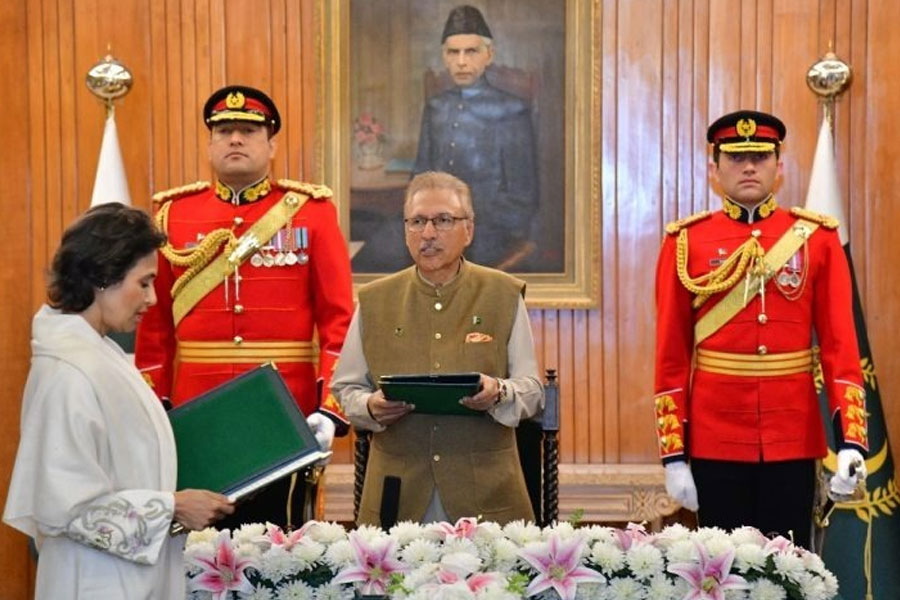Fauzia Viqar was Sworn in as Federal Ombudswoman
An oath-taking ceremony was held at Aiwan-e-Sadr to appoint Fauzia Viquar to office in accordance with Sections 3 and 21 of the Federal Ombudsman Institutional Reforms of 2013.
The President of Pakistan, Arif Alvi administered the ceremony, Fauzia Viqar has replaced Kashmala Tariq who has completed her tenure as the former Federal Ombudsman for Protection against Harassment at Workplace.
Although Tariq’s fixed four-year term as ombudsperson, which began on February 19, 2018, ended on February 18, 2022, she continued to hold office even after her tenure had expired.
Fauzia Viqar is a human rights activist. The ceremony was attended by senior government officials.
The agency is an autonomous quasi-judicial statutory body responsible for protecting workers against harassment in the workplace. It is dedicated to creating a safe working environment that is free from harassment, abuse, intimidation, and discrimination.
Reportedly, Fauzia Viqar has remained a former member of the National Commission on the Status of Women (NCSW) from Punjab and has played a vital role in the betterment of women and the protection of their rights.
3 Female Pakistani PhD Holders Open Up About Online Harassment by Own Countrymen
Understanding Workplace Harassment & Women’s Rights
Workplace harassment is a growing concern particularly for women in Pakistan, as it affects them in a negative and life-altering way. It is any unwanted behaviour that creates a hostile or intimidating work environment.
Harassment can take many forms, including sexual harassment, bullying, and discrimination. It is important for women in Pakistan to understand their rights and the laws in place to protect them from workplace harassment.
Pakistan’s laws on workplace harassment are governed by the Constitution of Pakistan and the Protection against Harassment of Women at the Workplace Act 2010.
Rights for Women in Pakistan Against Harassment
This act defines harassment as any unwelcomed sexual advance, request for sexual favours, or other verbal or physical conduct of a sexual nature. It also includes any other behaviour that creates an intimidating, hostile, or offensive work environment. The act applies to all employers and employees, regardless of their gender.
The law requires all employers to take steps to prevent harassment in the workplace and to provide a safe working environment for all employees.
Women in Pakistan Can Lodge Harassment Complaints
Employers must also take prompt action if they become aware of any harassment and must make sure that employees who make a complaint are not penalized in any way. The act also requires that all employers establish a complaint committee to receive, investigate, and dispose of complaints.
Victims of workplace harassment have the right to complain to their employer or to the complaint committee established by the employer. They can also file a complaint with the relevant government department, such as the Ministry of Women’s Development. The complaint should be made in writing and should include a description of the behaviour that was experienced, the names of any witnesses, and any other relevant information.
If an investigation is launched, the complaint committee will be responsible for conducting the investigation. They must complete the investigation within 90 days and must provide a written report to the victim and the employer. If the investigation finds that the complaint is justified, the employer must take appropriate action to stop the harassment and prevent it from happening again. The employer may also be required to take disciplinary action against the person responsible for the harassment.
Mehreen Shah Calls Out Director Ahsan Zaidi & Raj Gupta for Alleged Sexual Harassment in Baku
It is important for women in Pakistan to be aware of their rights and to understand the process for making a complaint. They should also be aware of the support services available to them, such as counselling and legal assistance. If a woman feels that her rights have been violated, she should not hesitate to make a complaint and seek help if she needs it.
In addition to the legal protections, there are also steps that women can take to protect themselves from workplace harassment. Women should be aware of the warning signs of harassment, such as unwanted attention or comments, and should take steps to protect themselves if they feel uncomfortable. They should also be aware of the workplace culture and should report any incidents of harassment to their employer.
Women in Pakistan can also take steps to improve their working environment by speaking out against harassment and by supporting other women who have experienced harassment. They can also seek support from organizations that work to prevent workplace harassment and promote women’s rights in the workplace. These organizations can provide women with information, support, and guidance on how to address workplace harassment and how to protect their rights.
Conclusion
In conclusion, workplace harassment is a serious issue for women in Pakistan, and it is important for women to understand their rights and the laws in place to protect them. The Protection against Harassment of Women at the Workplace Act 2010 provides women with legal protections against harassment and requires employers to take steps to prevent it from happening.
Women should also take steps to protect themselves and seek support if they experience harassment. By working together, women can create a safer and more inclusive work environment and can help to prevent workplace harassment.
What are your thoughts on this? Share them with us in the comments below.
Stay tuned to WOW360.
